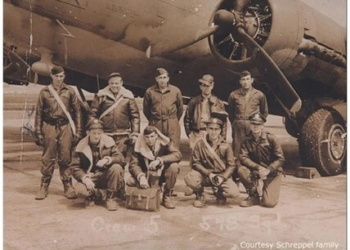A wrong decision made in Webb County, Texas, can turn a bleak situation into a type of resurrection. Especially for a veteran. A court-administered program is steering veterans onto a healthy track in this region of South Texas.
“The treatment court program is focused on serving those who have served us,” said Jerry Alva, the Webb County Regional Veterans Treatment Program Director.
The judicially supervised Veterans Treatment Court Program — managed by Texas’s 406th Judicial District Court — helps veterans charged with misdemeanor or felony offenses. Judges and attorneys in South Texas partner together to serve at-risk veterans who have entered the criminal court system.
“I’ve seen first hand how a veteran’s treatment court can change the path of a soul in need of help,” said Rebecca Patterson Lineman in a Texas Young Lawyers Association (TYLA) video. Lineman is a litigation lawyer and former Midland County, Texas, assistant district attorney. She noted that 20% of Texas veterans struggle with mental health issues related to combat.
Alva said the court’s non-traditional and individualized treatment services address alcohol and substance abuse and mental health and psychological issues.
The program’s premise is to provide veterans entering the criminal court system an avenue for team-approach treatment — comprised of veterans — that tackles the underlying causes of their criminal behavior.
Read: Former Navy SEAL advocates both physical, mental wellness for veterans
The veterans’ specialty court employs a rigorous approach to treatment, Alva said. The program uses an evidence-based method of treating addictions and behaviors to markedly improve the participants’ quality of life, coupled with intensive supervision, frequent court appearances, and random drug and alcohol testing.
“Through its structured approach, the treatment court is able to provide a sense of belonging and structure that allows veterans an opportunity to focus on their needs in a supportive environment,” Alva said.
According to the Texas Bar Journal, legislation passed in 2009 permitted veterans specialty courts in Texas. Harris County (Houston) established the state’s first veterans court. The Lone Star State possesses the second-largest veteran population in the nation, at more than 1.4 million.
The Webb County Veteran Treatment Court component, added in 2013, is an offshoot of the county’s drug court program.
“At the time we created our Veterans Treatment Court Program, here in Webb County, we were already conducting a non-veteran population drug court program and we were seeing the positive results,” said 406th District Court (Webb County, Texas) Judge Oscar J. Hale, Jr., in the TYLA video. “However, we also noticed that there was a need to provide services for our veteran population.”
Hale said between 40-60 veterans were being booked in the county jail annually. And nearly 75% had been arrested on drug- or alcohol-related offenses. Combat veterans had difficulty asking for help, he says, some of them afflicted with traumatic brain injuries (TBI) or post-traumatic stress disorder (PTSD).
“And some of those individuals who had suffered from either … while serving our country tended to either resort to drugs or alcohol to cope with their situation,” Hale said. “And so that’s the reason that we decided to create our Veterans Treatment Program.”
Overall, the Webb County Veteran Treatment Court Program has assisted more than 70 veterans. Participants have successfully navigated legal issues and gained critical control of addictions and combat-related traumas, Alva said.
“The treatment court boasts a recidivism rate well below the average at less than 4% for individuals who have successfully completed the program,” Alva said.
Veterans arrested on misdemeanor or felony charges and who suffer from PTSD, TBI, or other mental illnesses are eligible to participate. The court may also dismiss a criminal action if a veteran satisfactorily completes the program. However, the state must approve a defendant’s participation.
In 2016, the specialty court treatment program expanded to 10 South Texas counties, serving 15,000 veterans along a 300-mile stretch of the U.S.-Mexico border.
“Our service area is critically underserved by mental health professionals, and having a team of combat veterans serving their peers is essential to their well-being and allows for connections to be made, who without our program, would not be made and are very limited in our communities,” Alva said.
Read comments







































